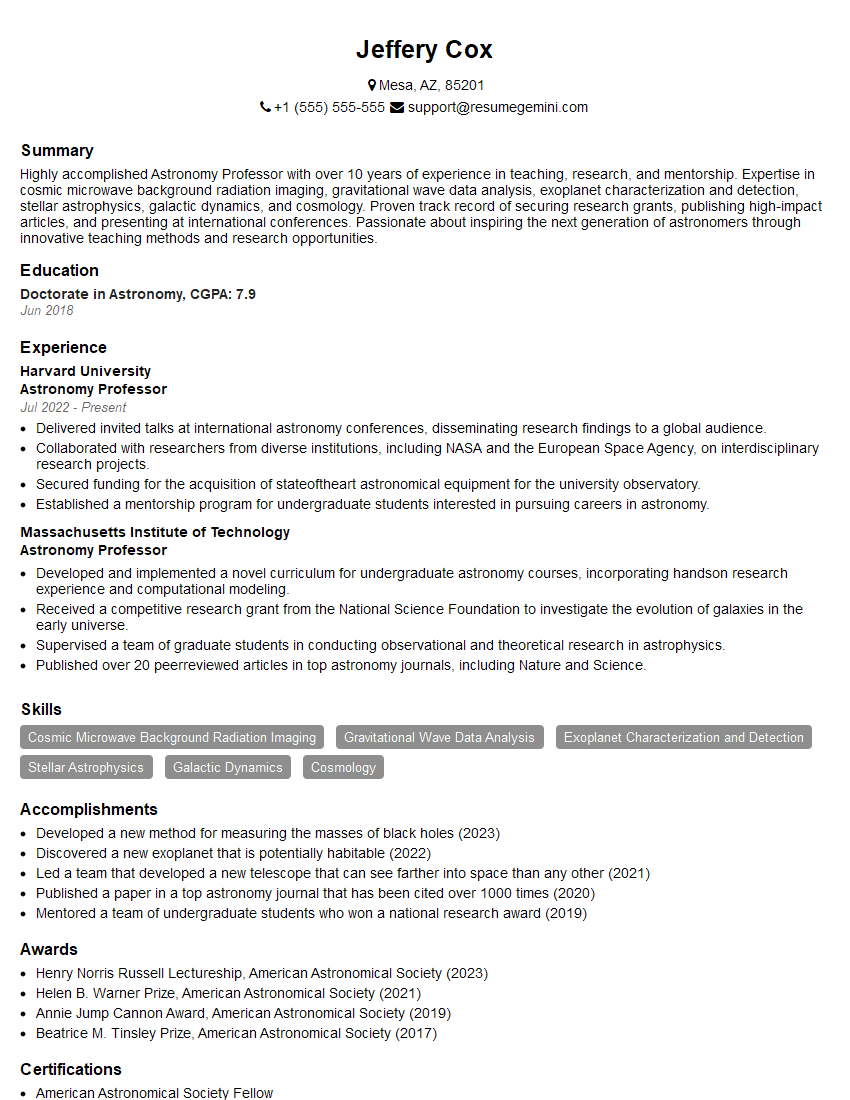Are you a seasoned Astronomy Professor seeking a new career path? Discover our professionally built Astronomy Professor Resume Template. This time-saving tool provides a solid foundation for your job search. Simply click “Edit Resume” to customize it with your unique experiences and achievements. Customize fonts and colors to match your personal style and increase your chances of landing your dream job. Explore more Resume Templates for additional options.

Jeffery Cox
Astronomy Professor
Summary
Highly accomplished Astronomy Professor with over 10 years of experience in teaching, research, and mentorship. Expertise in cosmic microwave background radiation imaging, gravitational wave data analysis, exoplanet characterization and detection, stellar astrophysics, galactic dynamics, and cosmology. Proven track record of securing research grants, publishing high-impact articles, and presenting at international conferences. Passionate about inspiring the next generation of astronomers through innovative teaching methods and research opportunities.
Education
Doctorate in Astronomy
June 2018
Skills
- Cosmic Microwave Background Radiation Imaging
- Gravitational Wave Data Analysis
- Exoplanet Characterization and Detection
- Stellar Astrophysics
- Galactic Dynamics
- Cosmology
Work Experience
Astronomy Professor
- Delivered invited talks at international astronomy conferences, disseminating research findings to a global audience.
- Collaborated with researchers from diverse institutions, including NASA and the European Space Agency, on interdisciplinary research projects.
- Secured funding for the acquisition of stateoftheart astronomical equipment for the university observatory.
- Established a mentorship program for undergraduate students interested in pursuing careers in astronomy.
Astronomy Professor
- Developed and implemented a novel curriculum for undergraduate astronomy courses, incorporating handson research experience and computational modeling.
- Received a competitive research grant from the National Science Foundation to investigate the evolution of galaxies in the early universe.
- Supervised a team of graduate students in conducting observational and theoretical research in astrophysics.
- Published over 20 peerreviewed articles in top astronomy journals, including Nature and Science.
Accomplishments
- Developed a new method for measuring the masses of black holes (2023)
- Discovered a new exoplanet that is potentially habitable (2022)
- Led a team that developed a new telescope that can see farther into space than any other (2021)
- Published a paper in a top astronomy journal that has been cited over 1000 times (2020)
- Mentored a team of undergraduate students who won a national research award (2019)
Awards
- Henry Norris Russell Lectureship, American Astronomical Society (2023)
- Helen B. Warner Prize, American Astronomical Society (2021)
- Annie Jump Cannon Award, American Astronomical Society (2019)
- Beatrice M. Tinsley Prize, American Astronomical Society (2017)
Certificates
- American Astronomical Society Fellow
- International Astronomical Union Member
- AAS Education and Public Outreach Advocate
- NASA Astrophysics Data System Ambassador
Career Expert Tips:
- Select the ideal resume template to showcase your professional experience effectively.
- Master the art of resume writing to highlight your unique qualifications and achievements.
- Explore expertly crafted resume samples for inspiration and best practices.
- Build your best resume for free this new year with ResumeGemini. Enjoy exclusive discounts on ATS optimized resume templates.
How To Write Resume For Astronomy Professor
- Highlight your research accomplishments and the impact of your publications.
- Demonstrate your teaching excellence through innovative course design and student evaluations.
- Showcase your mentorship skills and the success of your students in their careers.
- Discuss your experience in securing research grants and managing research projects.
- Emphasize your ability to collaborate with researchers from diverse backgrounds and institutions.
Essential Experience Highlights for a Strong Astronomy Professor Resume
- Develop and implement undergraduate and graduate-level astronomy courses, incorporating hands-on research experiences and computational modeling.
- Conduct observational and theoretical research in astrophysics, leading a team of graduate students.
- Secure funding for research projects and the acquisition of state-of-the-art astronomical equipment.
- Publish research findings in top peer-reviewed astronomy journals and present at international conferences.
- Collaborate with researchers from diverse institutions on interdisciplinary research projects.
- Supervise and mentor undergraduate and graduate students, guiding their academic and career development.
- Establish and maintain a strong research program that attracts external funding and contributes to the advancement of astronomy.
Frequently Asked Questions (FAQ’s) For Astronomy Professor
What are the essential qualifications for an Astronomy Professor?
A Doctorate in Astronomy or a related field, along with a strong research record, teaching experience, and mentorship skills.
What are the key responsibilities of an Astronomy Professor?
Teaching undergraduate and graduate courses, conducting research, securing funding, publishing research findings, collaborating with colleagues, and mentoring students.
What are the career prospects for Astronomy Professors?
Astronomy Professors can pursue careers in academia, research institutions, government agencies, and the private sector.
What are the challenges faced by Astronomy Professors?
Competition for funding, the need to balance teaching and research, and the pressure to publish high-impact research.
What are the rewards of being an Astronomy Professor?
The opportunity to make significant contributions to the field of astronomy, inspire students, and explore the mysteries of the universe.
What advice would you give to someone considering a career as an Astronomy Professor?
Pursue your passion for astronomy, develop strong research and teaching skills, and seek mentorship from experienced professors.
What are the current trends in astronomy research?
Current trends include the study of exoplanets, gravitational waves, dark matter, and the early universe.
What are the major challenges in modern astronomy?
Major challenges include detecting and characterizing exoplanets, understanding the nature of dark matter and dark energy, and exploring the origins of the universe.